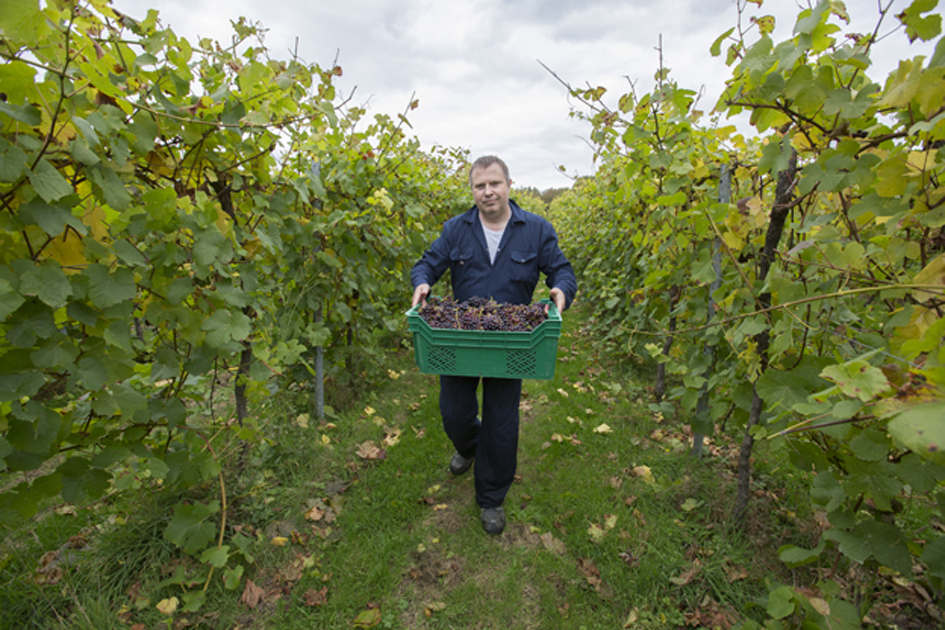Liz Sagues looks back on last month’s Circle of Wine Writers seminar on still English wine and why it sparkles just as much as English sparkling wine.
The decision to focus the Circle’s June 26th webinar on English still wine rather than sparkling was a deliberate one. Coronavirus restrictions permitting, the committee is planning a masterclass and tasting early in November to help bring the too-much-overlooked sibling to proper prominence. This session was an informative and fascinating preliminary to that.
Sam Linter, managing director and head winemaker at Bolney, the vineyard established by her parents 48 years ago, was the perfect choice to present it. Beyond Bolney, which has always championed still wine, she is a director of trade body WineGB.
As with all good stories, she began at the beginning, the bad old days. They were very bad, she stressed, as the new wave of English wine producers in the 1970s planted great swathes of Germanic hybrids and crosses, Müller-Thurgau in particular. “A disaster” — they didn’t like English rain, there was pervasive mildew and rotten grapes, the winemakers failed to realise that bad grapes made bad wine. “Rightly, the wine had a very bad reputation.” There were efforts to improve, but they were small and slow.
Only with the emergence of fine sparkling wine from Nyetimber and, soon afterwards, Ridgeview, did the attitude to English wine change. There was investment, “but sparkling was where the money went”. But, in the background, the producers of still wine were moving on, selecting better grape varieties, implementing canopy management, learning that they could ripen grapes — even red grapes — and control acidity. The emphasis moved from quantity to quality.
Clean, pretty, elegant still wines emerged. “People slowly started to notice.” Sparkling wine opened up England to the wine world, and now still wine is catching up, she said.
With Bolney, the emphasis has been on innovation. When Sam studied at Plumpton in the early 1990s the only still English wines were whites; in 1998 she made Bolney’s first red, a Rondo and Dornfelder blend. “It was semi-decent, but we needed to do a whole lot better.” In 2007 the estate had its first Waitrose listing — a red wine. Soon, though, Pinot Noir took precedence. The style is light and elegant, and it is, Sam believes, the UK’s “hero” still red variety.
Bolney lies on the same warm sandstone ridge as Nyetimber, a fortunate but not foreseen choice when Sam’s parents, Rodney and Janet Pratt, bought the former chicken farm and planted their first three acres of vines in 1972. Under Sam’s leadership more land on the ridge has been added, and has made a big difference to the scale of the operation — Bolney is now the UK’s 10th largest producer, making some 250,000 bottles a year from its own grapes and with potential for up to double that in the new winery completed last year. In 2012, the estate was named IWSC UK wine producer of the year; in 2017, it was Winery of the Year at the UK Wine Awards.
Sparkling wine (even a red) is made as well as still reds and whites, “but we will always be still winemakers at heart”. And alongside the importance of making quality wine, Bolney has been a pioneer in wine tourism, essential if UK wine producers are to gain the home market that will ensure long-term success.
Questions and discussion were wide ranging, with points ranging from cost (“we need to go for quality, that people will accept to pay for, so lower yields and better ripeness”) to the best varieties for greensand (warmer than chalk, so Chardonnay, for example, shows riper characteristics and Pinot Gris excels there much more than on clay), from “hero” varieties (“they’re good to have but it’s a moving picture and a shame to stop now — let’s keep it open”) to the sustainability of still wine producers in inevitable years of poor harvest (the Bolney approach is to build stocks and create flexibility with the Bolney Bubbly blend using grapes not quite ripe enough for still wines).
Sam’s conclusion was encouraging: “Nothing in England will stop evolving. We are pioneers and innovators and we know there is so much still to do.”
A link to a recording of Sam’s presentation is available on the members’ area of the Circle website for those who missed the live session. The provisional date for the Circle English still wine seminar and tasting, which is generously supported by The Wine Guild, is November 2nd.

